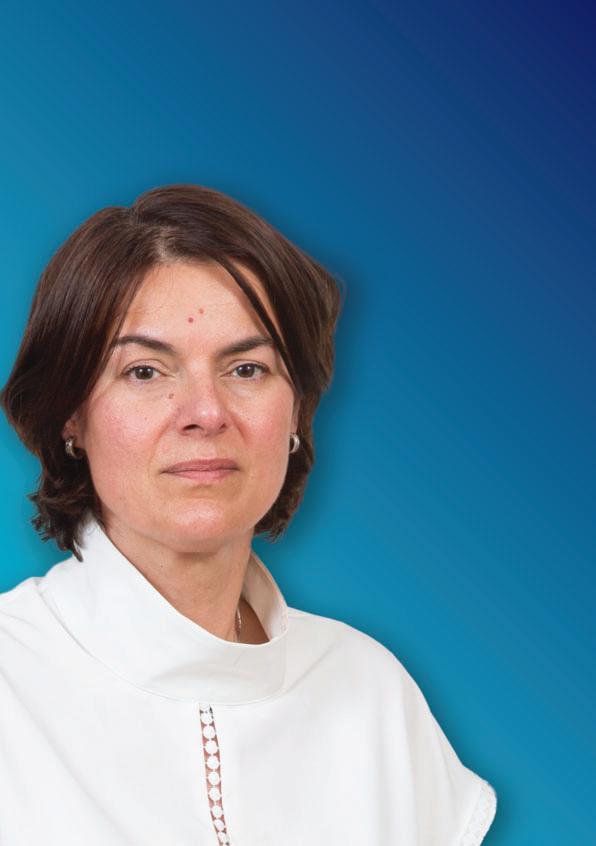

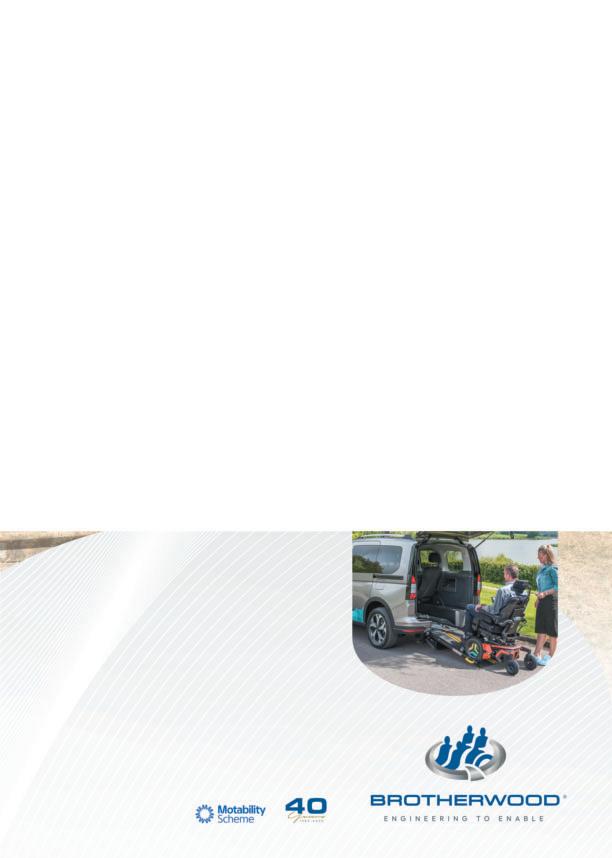







Reading the inspiring experiences of people with MND showcased in this issue of Thumb Print is heartwarming - people like Steve Ashton, who flew a jet fighter thanks to a grant from us; Paul Jameson, who broke four World Records in one weekend; and Seckin McGuirk, who had her likeness captured in ice as part of our Prescribe Life campaign. It’s also a very real demonstration of how people in the MND community remain so determined to live their ambitions and make every day count. That’s why, as your Association, we must do the same.
We’ve encapsulated those qualities in our new organisational values – we're one strong team, we make every day count, we think big, we are determined. These came from listening to you and understanding what you need from us, and will now drive everything we do – if an activity or idea doesn’t demonstrate our values, we’ll strive to improve it, so it does.
You’ll hear more about our values over the coming months –more importantly, you’ll see them in action as they support us to deliver our strategy over the next five years. And, of course, they’re a key element of our new brand which we’re unveiling in January. To give us the space to launch our brand as widely


On the cover
Seckin McQuirk, who has SOD1 MND is calling on Government for equitable access to tofersen. Her life-size ice sculpture melting throughout our day of action in Westminster was a stark reminder of time slipping away.
as possible, we’re pausing our winter issue of Thumb Print and relaunching our members’ magazine in the spring. We’d love you to tell us what you want from that – please take a few minutes to complete and return the enclosed survey, alternatively you can scan the printed QR code or complete online.
In the meantime, there’s plenty to read within these pages including reports from EnCouRage (p8), our Prescribe Life day of action (p4) and the exploits of our fundraisers during marathon season (p28).
There are also previews of this year’s 7 in 7 Challenge (p27) which will see our patron Kevin Sinfield pulling on his trainers once again, our Christmas Concert (p13) and our 36th International Symposium (p29), which you’ll be able to follow via our new Live Feed feature on our website.
Speaking of our website, do pay a visit if you haven’t done so for a while. You’ll find lots of information and support, as well as Association news and ways to get involved in many aspects of our work.
This is always a busy time of year with fundraising opportunities, events and seasonal gatherings giving us the chance to get together. At the same time, we’re laying down plans for 2026 – big plans, because that’s what our community needs and deserves. I look forward to working with you, as one strong team, to deliver them.


Prescribe Life at Westminster Taking the fight to the heart of Government. EnCouRage 2025 Inspiring tomorrow’s MND research leaders.
“We’re getting ready” Kev Sinfield CBE prepares for a sixth Challenge.
“More than a support group” Tracy Sanderson - sharing lived experiences.
Thumb Print is the quarterly magazine of the Motor Neurone Disease Association, Francis Crick House, 6 Summerhouse Road, Moulton Park, Northampton, NN3 6BJ. Reg. charity number 294354.
Editorial and advertising enquiries: Telephone 01604 250505 Email editor@mndassociation.org
If you have comments or feedback about the magazine and its content, please do not hesitate to get in touch.
Thumb Print is available to read online and as a downloadable pdf at www.mndassociation.org/thumbprint
The views expressed in Thumb Print are not necessarily those of the Association. The advertisement of third party products or services does not in any way imply endorsement by the MND Association nor that those products or services will be provided, funded or available via the Association.
All content © MND Association 2025.
2 - We won’t rest until everyone gets the care they need when they need it

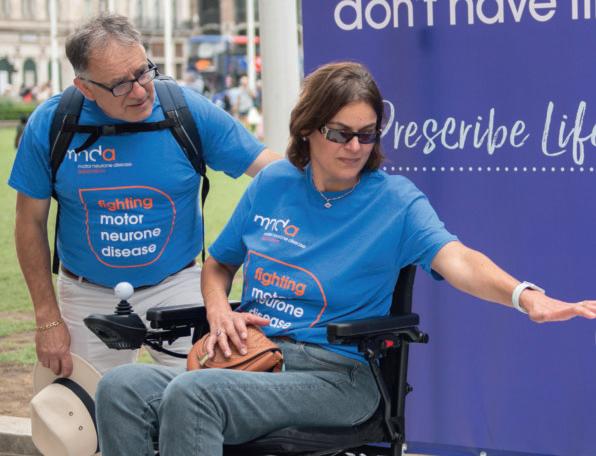
















In July, we took our Prescribe Life campaign, fighting for access to ground-breaking drug tofersen, to Westminster. As MPs and civil servants arrived at Parliament, they were met with a powerful symbol of the impact of government inaction - a melting, life-sized ice sculpture of Seckin McGuirk, who has SOD1 MND.
For the 2% of people with MND caused by a change in the SOD1 gene, tofersen slows progression of symptoms. Pharmaceutical company Biogen is giving the drug for free, but around 20 people in the UK can’t access it because the NHS won’t cover the cost of administering it.
Our day of action timeline
8am:
It’s overcast as staff arrive. Rubber matting is laid to protect Parliament Square Garden. We set up our cameras.
9am:
The Icebox team start setting up. Passers-by watch as they assemble the 5ft sculpture, modelled on photos of Seckin, from four blocks of ice.





10am:










The sculpture’s drawing a crowd giving Association staff chance to talk to onlookers. As the day warms, the sculpture melts, symbolising the urgency of action needed. Every day the NHS delays, symptoms worsen. Tofersen can stop that.
Jennifer Watkins, one of the team responsible for the day of action, said: “It’s been six weeks of hard work but I feel incredibly privileged to be involved. We need our campaign to reach those people we need to listen.”
10.30am:
Seckin arrives with husband Richard and son Aiden.
We share the powerful moment on social media, resulting in a spike in petition signatories.
Seckin said: “This is an amazing representation of the illness. You just melt away over time until there’s nothing left. Tofersen has given me hope. When you have hope, you have strength to do things.”





“I ask the Government to hear our voice. Imagine if this was your mother, your sister, your brother...? There’s a solution, and you’re not giving it to to us. I need you to act fast - please.”











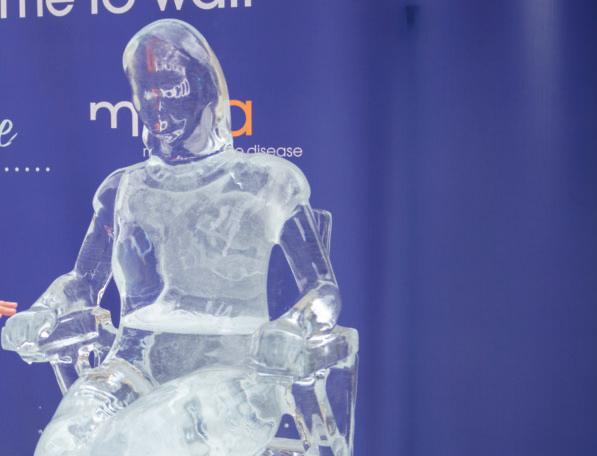
12.30pm:
A BBC crew arrives. The reporter interviews Seckin. She tells them: “I’m hoping, if I have the privilege of receiving tofersen, I can learn to live with MND and make long term plans. It’s incredibly tough for my family; seeing your loved one deteriorating cannot be easy.”
The reporter interviews Richard Evans, our Director of Engagement, who says: “Every day the NHS fails to give Seckin and others the same free medicine it’s giving other people, their disease progresses.”
1.30pm:
Word spreads. Frank McNally MP talks about Prescribe Life in the House of Commons.
A puddle has formed at the base of the sculpture. Seckin’s message is clear. “I ask the Government to hear our voice. Imagine if this was your mother, your sister, your brother...? There’s a solution, and you’re not giving it to us. I need you to act fast - please.”

2.30pm:








Seckin Seckin McGuirk cGuirk M
21,859 people signed the petition
We’re joined by Ellis Millard, who also can’t access tofersen, and Association trustee Eleanor Dalley, on the walk to the Department of Health and Social Care (DHSC).
Eleanor says: “We’re calling on the government to help those unable to access this life-saving treatment - a treatment I’m receiving that has had a massive impact on my life for the good. There are people who can’t access this drug, and that’s criminal.”
3pm:
The group hands in the 21,859 signature petition.
Richard said: “We’re proud of taking such strong action, but this is a day we wish wasn’t needed. We will continue the fight.”
Launched in 2015, using Ice Bucket Challenge funds, our Non-Clinical Fellowship programme is marking 10 years of supporting early and mid-career researchers who have chosen to devote themselves entirely to laboratorybased and data-driven MND research.
In that time, the Fellowship programme has funded 25 researchers working across 12 institutions in the UK and Ireland, to the tune of more than £6.6 million.
Dr Brian Dickie, Chief Scientist at the MND Association. said: “These fellowships have played a crucial role in building a sustainable and skilled research workforce. Of the 25 fellows we’ve supported, 23 are still working in MND research today – a clear indication that the programme is achieving what we hoped - attracting, training and retaining the best and brightest minds in the field of MND.”
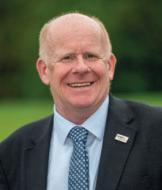
“Some of our first fellows now lead research teams that include our newest fellows, It’s rewarding to see that kind of continuity and growth, and it demonstrates how our programme is building capacity in MND research.”
Dr Brian Dickie MBE, Chief Scientist MND Association
Through junior and senior fellowships, we support researchers through their learning and development towards becoming independent researchers able to take forward their own ideas and eventually lead their own laboratories.
The programme’s impact is already far-reaching. Association fellows have uncovered new genes and pathways, launched biotech spinouts and formed global collaborations.
As we mark this 10-year milestone, thanks to the tireless efforts of our supporters and funders, we will continue to grow and support the next generation of MND researchers.
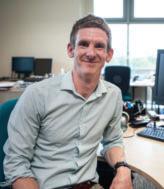
“The fellowship allowed me to carve out my own niche in areas of MND research and test myself to see whether I was up to the challenge of being an MND Association fellow. But I'm here 10 years later, so it looks like I was up to the challenge in the end.”
Dr Scott Allen, University of Sheffield
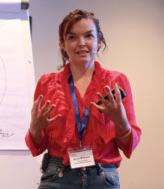
“It helped me to become a more independent scientist and advance towards a leadership role, providing the critical support for me to move towards becoming an assistant professor.”
Dr Roisin McMackin, Trinity College Dublin
An incredible £4.1 million has been raised for the MND Association by the Omaze Million Pound House Draw, helping to revolutionise progress in the fight against MND.
In July, people with MND, volunteers and staff came together to celebrate the incredible success of our six-week partnership with Omaze.
At a special event held in the grounds of the stunning beachfront home in Sussex, which was won by former taxi driver, James Moughton, people from across the MND community celebrated the success of the draw which will drive forward the development of the MND Association Research Nurse Network.
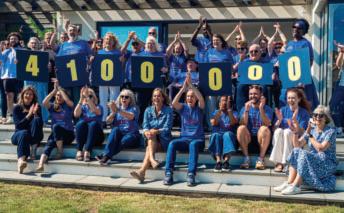
The first specialist MND Association Research Nurses are now in post.
Experienced research nurse Andy Hamilton was the first to join the Association’s ground-breaking Research Nurse Network in July and is part of the Newcastle Care Centre team based at The Royal Victoria Infirmary.
The subsequent recruitment of Emelda Veraque to the Leeds MND Care Centre team was swiftly followed by Michael Jay Saguan's appointment to St George's Care and Research Network in London.
A further 14 roles across England, Wales and Northern Ireland have been approved for recruitment in the coming months.
Andy said: “I feel privileged that my role is the first in the country to receive funding from the MND Association. This role will support our integrated service development and help to ensure everyone with MND has the option to be involved in clinical research projects.”
The MND Association Research Nurse Network, a £7.2 million commitment over four years from the Association, will bridge the gap between people with MND and researchers. Specialist nurses will offer people with MND information about research, identify trials they are eligible for, explain what is involved, and provide ongoing support if they choose to take part.
Tanya Curry, Chief Executive, said: “Our community has told us just how challenging it can be to get the information they need about taking part in clinical trials.
“It’s a complex process, and one which can rob them of precious time with their loved ones. This has to change. We want to give everyone living with MND the choice to take part in and influence the future of MND research.
“Our MND Association Research Nurse Network is now doing that, providing the support, expertise and knowledge
needed to create equitable access to trials for all. It’s a big investment and one that will make a huge difference to people with MND and revolutionise how trials are accessed across England, Wales and Northern Ireland.”
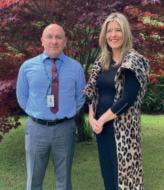
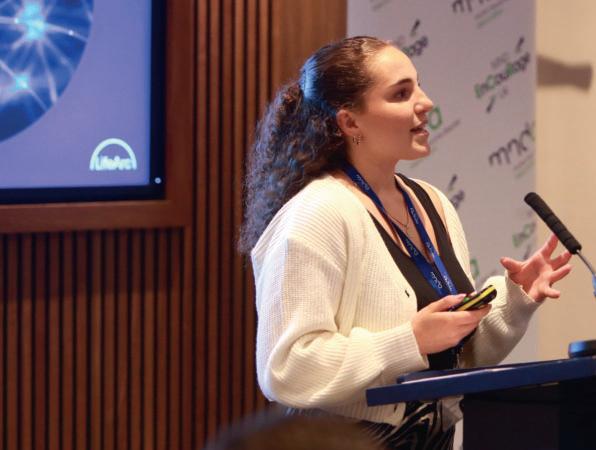
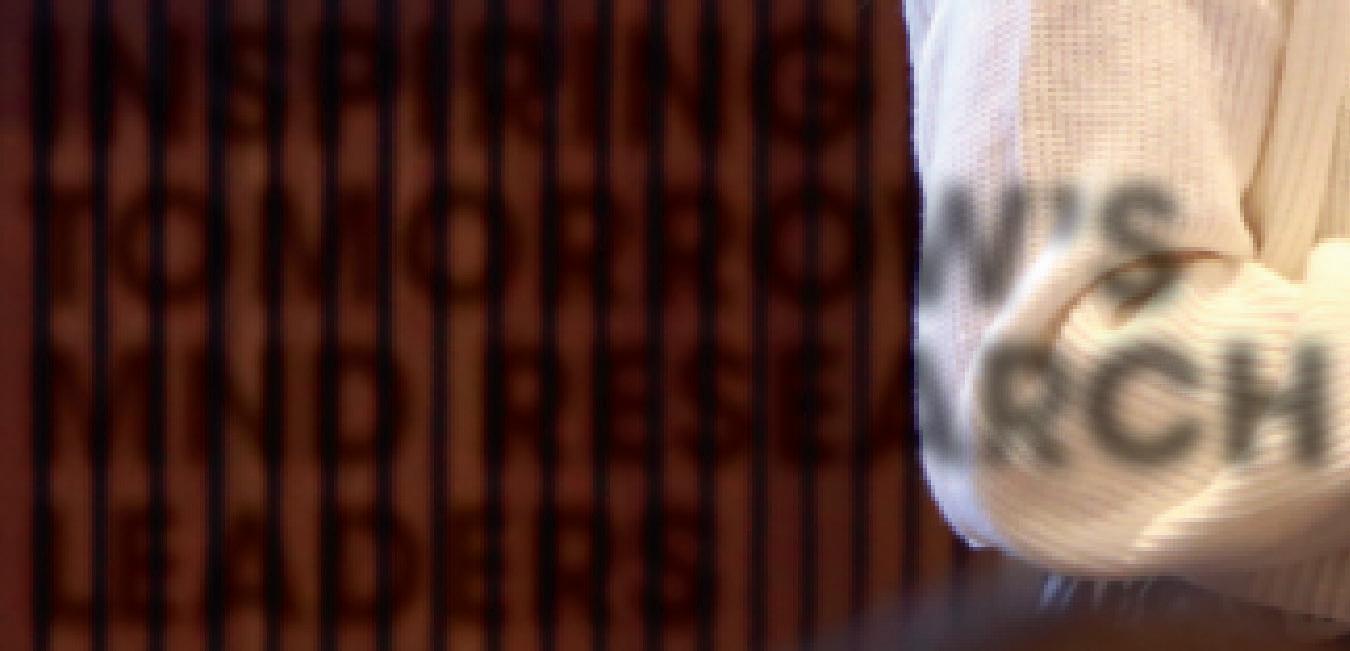
Francesca Webb, Molecular and Cellular Scientist at LifeArc
“It’s an experience I’ll never forget.” That was the verdict of Molly Magarotto, PhD student at the University of York after this year’s MND EnCouRage event, which brought together early career researchers (ECRs), experts in the field and people affected by MND.
Molly was one of 21 talented scientists at the two-day event in Loughborough, organised by the MND Association, which aims to inspire, enthuse and educate people starting out in their MND research careers.
The ECRs took part in discussions with experts, attended talks and interactive workshops, presented their work and had the chance, some for the first time, to meet people affected by MND.
Professor Dame Pamela Shaw, Professor of Neurology and Director of the Sheffield Institute for Translational Neuroscience said: “All the ECRs enthused about how positive it was, and
what a friendly environment. People aren’t afraid to present their work and ask questions, and I think seeing people with the medical condition they’re working on is so inspiring, especially for young scientists who don’t see patients in clinic. We want to keep those clever brains in the field of MND.”
A session on the ‘real-world perspectives of MND’ featured Anna Barrow, who has MND, and her husband Martyn sharing an insight on the impact of MND on their family life.
Francesca Webb, researcher at LifeArc said: “It’s inspiring to hear their story, it really brings back the why of what we’re doing.”
Dr Caroline Vance, Senior Lecturer at King’s College London said: “EnCouRage brings together people who work in the field of research to meet people with the disease. This allows them to understand the significance of what they’re working on.”








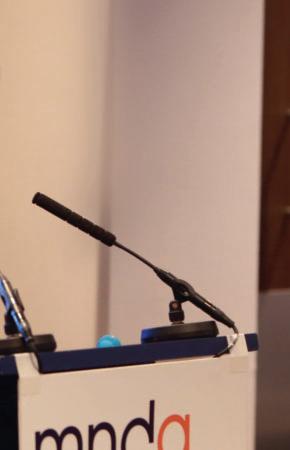



“It’s given me so o much more energy and enthusiasm for or the field. Connecting with people p p e eo l affected by MND has been really impactful and is going to fuel my research.” s a c e e h. r r ”















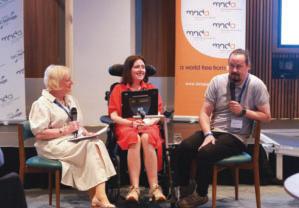




Dr





Emma Dyke, King’s g s Kin ’ College London





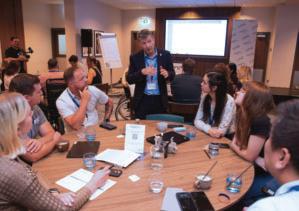
On day two, the ECRs gave ‘lightning talks’, short lay summaries of their work, followed by informal discussions about their research.
Molly Magarotto said: “It was an incredible experience presenting to a lay audience, connecting with other ECRs, and meeting people affected by MND. It’s an experience I’ll never forget.”
Ellis Carter, Research Assistant at the University of Newcastle said: “The highlight was learning how to communicate with people living with MND and making my research clear to them.”
Dr Jennie Starkey, who has MND said: “Hearing all the hypotheses and ideas gives you hope that, behind the scenes, people are trying their best to come up with therapies.”
Dr Helen Chen, researcher at the University of Manchester and living with MND said: “There was a lot of focus at this year’s event on presentation and storytelling. I think EnCouRage offers an incredible experience for early career researchers.”
The ECRs also heard from Professor Ammar Al-Chalabi, King’s College London, and Professor Dame Pamela Shaw, showcasing progress in MND care and research, providing inspiration for their future work.
By Steve Ashton, who is living with MND
There are many things I can’t do now, but I still try to push things as far as I can. My wonderful MND nurses often give me a kindhearted telling off, asking, ‘have you been up any ladders recently?’
My legs are weaker, and I tire easily, but my interests and passions, including flying, are as strong as ever. Aviation has been part of my life since childhood. My father served in the RAF, and I once applied for co-pilot training with Britannia Airways. When that didn’t work out, I turned to gliding and the occasional powered flight.
I’d always wanted to fly a jet. Before a recent MND clinic, I’d visited my local airport and met a pilot who had trained on a Jet Provost. I told one of the nurses I wanted to get into one. After a short silence, probably of disbelief, the nurse suggested applying to the MND Association for a grant to make it happen.
To my surprise the Association offered me a grant of £500. For the first time in a long while, I felt a surge of excitement.
Due to my mobility, I used step ladders to get inside. After a test to ensure I could evacuate safely, the big day arrived.
Though I couldn’t handle take-off or landing, I was given control mid-flight, navigating over the valleys of North Yorkshire. With decades of flight simulator experience, the handling felt familiar, only much faster.
For that one unforgettable hour, I wasn’t thinking about MND. And for the first time since my diagnosis in 2017, I truly felt alive again. I’ll be forever grateful to the charity for making this happen.
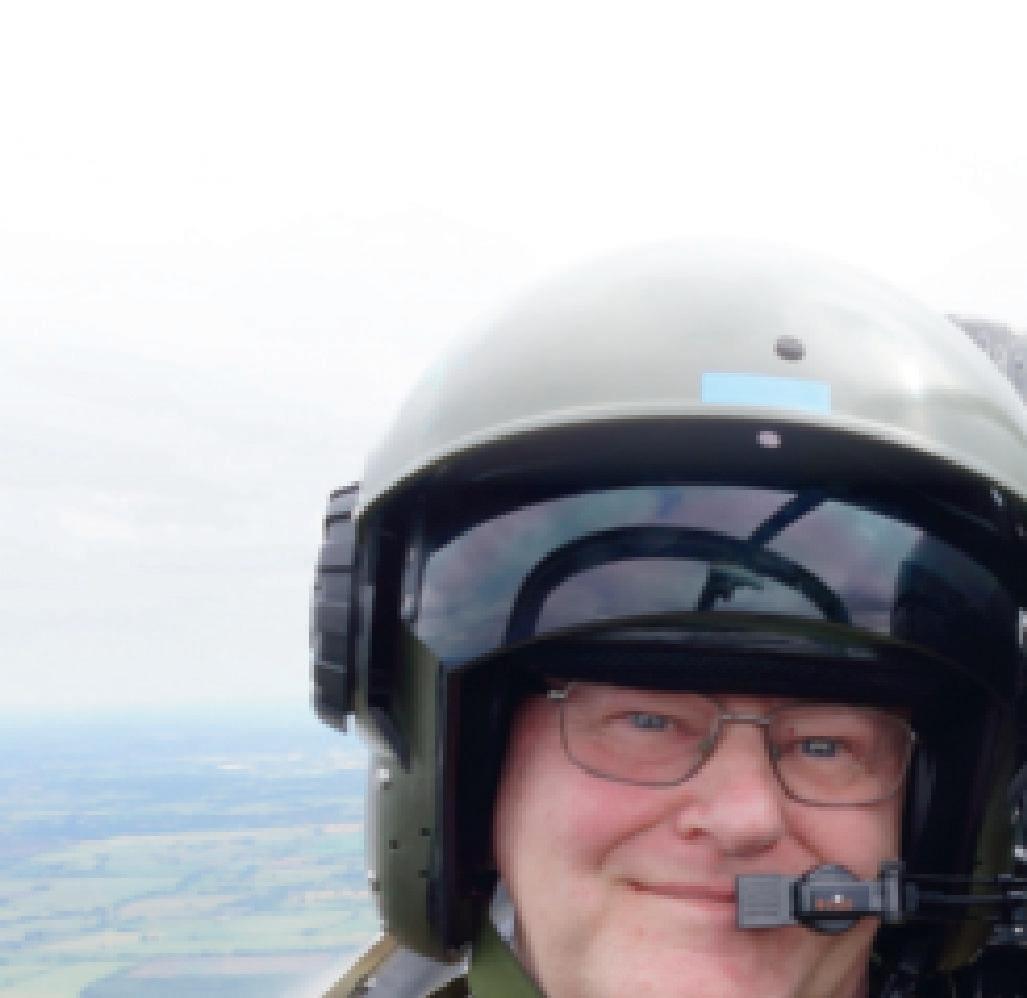
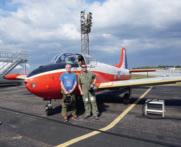
To find out more about MND Association support grants scan the QR code or visit www.mndassociation.org/grants or contact MND Connect on 0808 802 6262.
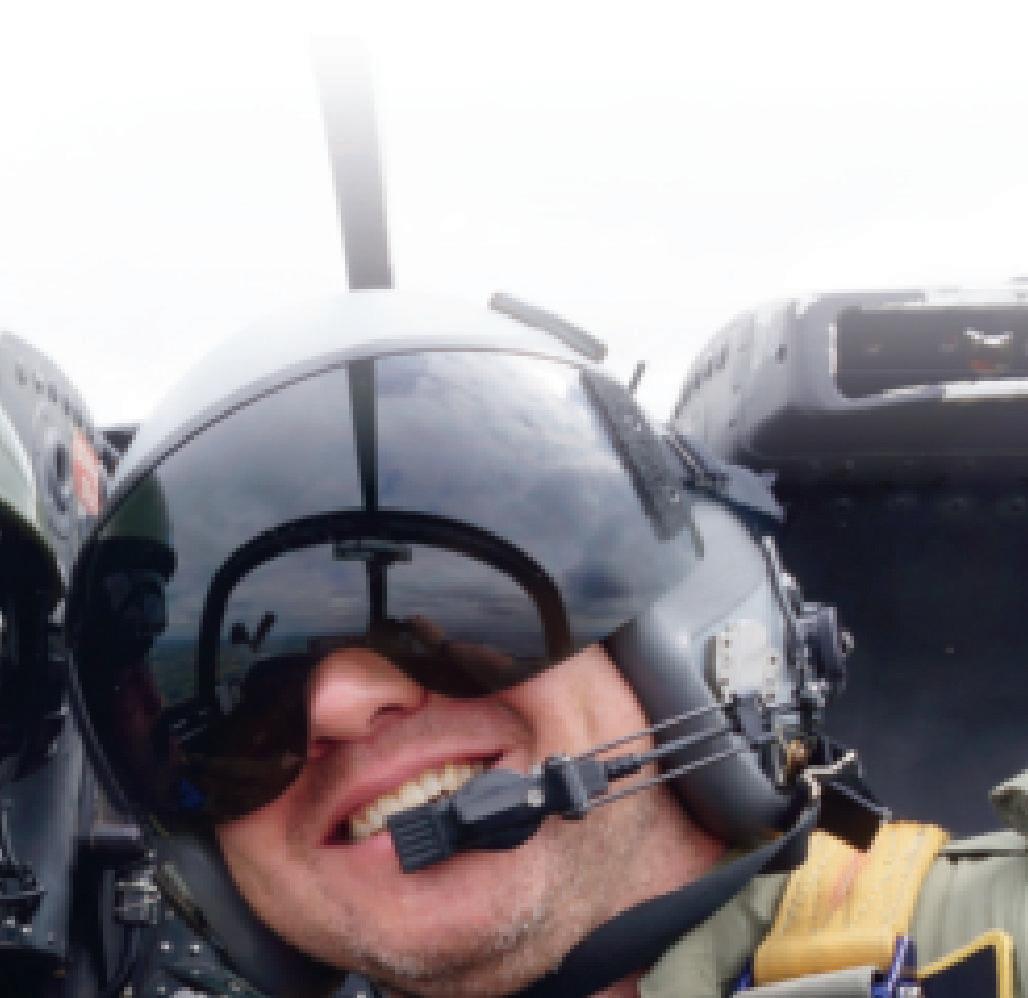
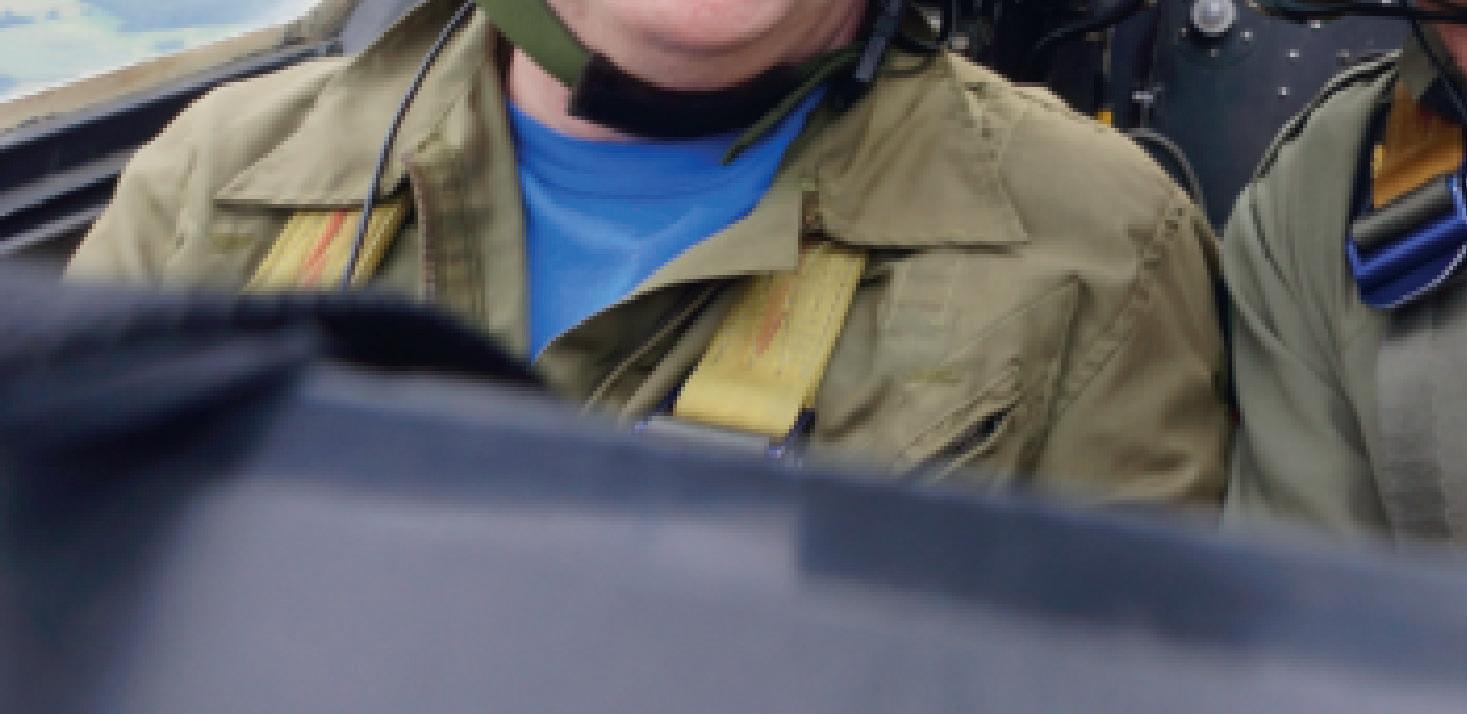
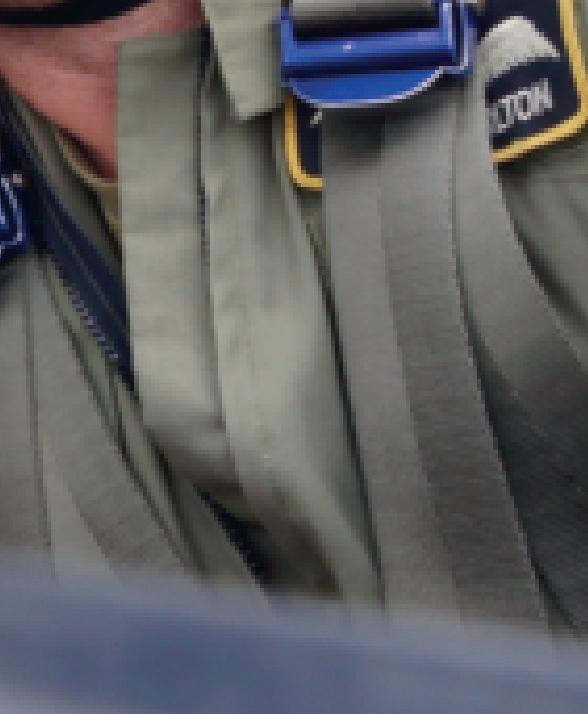



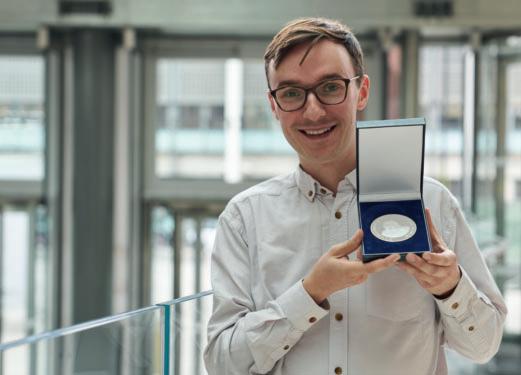




“I am truly honoured to receive this prize. The dedication and courage of Rob Burrow, his family, and and his friend Kevin Sinfield are deeply inspiring."










Dr Oscar Wilkins

Our congratulations to University College London scientist Dr Oscar Wilkins, who has been awarded the first Rob Burrow Early Career Researcher (ECR) Prize launched in honour of our late patron.
Oscar’s award was announced at a research conference in London in September, where he was presented with a commemorative medal, £10,000 funding and a travel bursary to attend the MND Association’s International Symposium on ALS/MND in San Diego in December.
The award has been created by the MND Association, in collaboration with the Burrow family, to mark the incredible impact Rob had through his courage and commitment to raising awareness of
MND. It will be presented each year to an outstanding UK-based researcher in the early stages of their career, chosen by a panel of judges.
Oscar was motivated to study MND after a family member died from the disease. With his supervisor Professor Pietro Fratta, he is now developing a new cutting-edge gene therapy which, if successful in trials, could lead to a potential new and safe treatment for MND.
Oscar said: “I am truly honoured to receive this prize. The dedication and courage of Rob Burrow, his family, and his friend Kevin Sinfield are deeply inspiring. Thank you to everyone who has donated to MND research - our
work pushing for progress would not be possible without you.”
Geoff Burrow, Rob’s father said: “It is wonderful to see Rob’s legacy helping to support such ground-breaking work - Rob would be so proud to see this happen. I would love to think this work will make crucial progress in our fight against MND.”
Dr Brian Dickie, Chief Scientist at the MND Association, said: “Dr Wilkins is a shining example of a truly exceptional early career researcher. The research he is involved in, if successful, could have a huge impact on people with MND in the future. There is no doubt that the future of MND research in this country is in excellent hands.”
By Dr Mike Rogers MBE, Director of Research and Innovation, MND Association
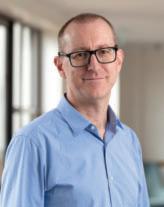
Dr Mike Rogers MBE, Director of Research and Innovation
Right now, we stand on the edge of a new era in MND research – one the MND Association is determined to pursue with unwavering focus, aiming to deliver effective new treatments.
To do this, we’re developing a bold fiveyear research and innovation strategy to pave the way for the new treatments people with MND desperately need. And, as ever, our community will be right at the heart of it, with their voices, experiences and insights helping us shape our direction towards tomorrow’s treatments.
The progress we’ve seen in recent years from breakthroughs in genetics to powerful new uses of AI has opened
doors that were unimaginable just a decade ago. International collaborations like the Longitude Prize on ALS are accelerating discovery, while DNA biobanks are giving scientists the tools they need to develop and test promising treatments faster than ever before.
The MND community in its support of the Association has driven this progress by enabling us to invest in cutting-edge research, as well as nurture the best and brightest young scientific minds.
While there is still much for us to learn about MND and much work to do, by working together and uniting as one community behind our vision of ‘a world free from MND’, I know our moment will come.
York and Scarborough Teaching Hospitals NHS Foundation Trust have joined MND-SMART, a UKwide clinical trial seeking effective treatments for MND, making it easier for people in the region to take part. Led by Principal Investigator and Consultant Neurologist, Dr Malcolm Proudfoot, York and Scarborough Hospitals are the latest centres to open recruitment.
MND-SMART is run by the Euan MacDonald Centre for MND Research at the University of Edinburgh and is open to most people living with MND across the UK. The trial’s innovative design allows several potential treatments to be tested at the same time, reducing costs, speeding up the results and limiting the number of participants given a placebo.
The trial has recently added a new drug, Tacrolimus, for testing. Already used in organ transplant medicine and
immune conditions, laboratory studies suggest Tacrolimus may help prevent the formation of harmful protein clumps and reduce inflammation in the nervous system – two key problems in MND.
York and Scarborough’s inclusion mean more people can now take part in this vital research without travelling long distances. The MND Association is one of the funders of MND-SMART having committed £500,000 to the trial in 2023 as part of a joint £2.5 million investment with MND Scotland.
“We are delighted to contribute to a clinical trial platform which is intent on achieving greater equity of access with people with MND. We are pleased our funding will help towards aiding the clinical testing of potential new therapies.”
Dr Brian Dickie, Chief Scientist, MND Association
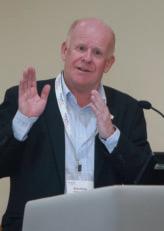
Dr Brian Dickie MBE, Chief Scientist
The Manchester and District Branch of the MND Association took part in this year’s Manchester Pride, walking in solidarity to raise awareness of MND.
They were joined by family, friends and staff from Jones Lang LaSalle, where Branch Committee member Paul Golds works. The company also contributed towards the cost of the special MND t-shirts worn during the parade.
This year marked the Association’s third appearance at the festival and its biggest turnout yet, with 33 volunteers, supporters and people affected by MND joining the vibrant day in August.
Paul, who helped organise the event, first connected with his local branch following his mum’s diagnosis of MND in 2018. He said: “Some of us are wheelchair users, some wore glitter, but all of us waved our MND flags. This year felt extra special, the weather was perfect, the crowds were cheering, and it was such a joyful day. As a member of the LGBTQ+ community, it means so much to be visible and show support.”
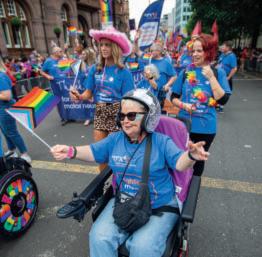



You are invited to join special guests and supporters at the MND Association’s Christmas Concert this December.
Following the success of last year’s inaugural concert, London will once again host this festive evening on Tuesday 16 December.
The concert will be hosted by our patron, broadcaster Charlotte Hawkins and feature performances from the London International Gospel Choir and readings by VIP guests. There will be a moment of reflection to pause, in the spirit of hope and togetherness.
The MND Association’s Chief Executive Tanya Curry said: “Last year’s concert was a wonderful way to bring our community together for an evening of uplifting music, laughter and quiet reflection.
“I’m looking forward to meeting this year’s guests at what promises to be another memorable and truly magical evening.”
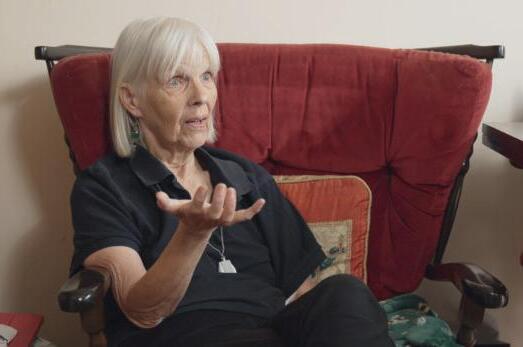


Our Information and Professional Development team provides quality resources to help people affected by MND live as well as possible. A vital part of that work is listening to the people who use the resources.
All the care information produced by our specialist team is reviewed by a group of people living with MND to ensure it is practical, clear and relevant. Jenny, who is living with MND, recently helped review our Inherited MND and genetic testing booklet, a resource designed to help people understand genetic counselling and testing. Jenny said: “It’s a complicated topic and this resource is a
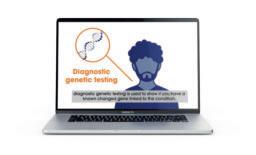
good starting point for people who want to find out more.”
Feedback from Jenny and the rest of the user review group highlighted the need for simpler, more visual explanations. In response, we created What is genetic testing? - a short animation that covers the basics and directs viewers to the booklet for more detailed information.
Our user review group played a key role in shaping the animation - reviewing the script, subtitles and storyboard. Sue Vale, who is living with MND, described it as: “Good, informative and helpful, without being frightening.”
When people asked for more guidance around making decisions about genetic testing, it led to the creation of myMNDgenetest. This is an interactive tool offering two decision aids, available online and as a download. It was developed in collaboration with the Universities of Sheffield and Leeds, with support from families affected by MND, professionals and the MND Association. For Jenny, our approach to developing care information is reassuring. She said: “It’s good the Association is asking us to review these resources. We have firsthand knowledge that will hopefully be of use to others.”
“It’s been wonderful to contribute my knowledge and skills. I’ll be sharing this guide with our care workers to help them support our clients with MND.”
Leighann

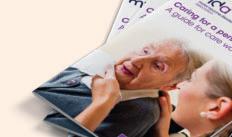
Wickers, Care Service Manager at Right at Home Solent and Southampton
We also work closely with health and social care professionals to keep our information accurate and support the best possible care for people with MND.
We recently revised our Guide for Care Workers after consulting with care agency staff. One contributor raised the challenge of supporting people who are emotionally vulnerable or resistant to advice. As a result, we added new advice on recognising distress and responding when advice is declined.
Leighann Wickers, Care Service Manager at Right at Home Solent and Southampton said: “It’s been wonderful to contribute my knowledge and skills. I’ll be sharing this guide with our care workers to help them support our clients with MND.”
Feedback shapes the education events we design and deliver for MND health and social care professionals. After requests for targeted information on respiratory care, this year we have launched a new series of workshops, covering identification, assessment and management of respiratory issues.
Sharing MND care developments
Professionals help us respond to new developments in MND care. When new guidance on lung volume recruitment (LVR) bags was published, Stephanie Mansell, Consultant Physiotherapist and Research Fellow at UCL, approached us to share it with the MND community.
Stephanie will present this guidance in an MND Association webinar this autumn. She said: “Having attended the Association’s excellent webinars, approaching them was a no-brainer. I’m delighted they’ve agreed to provide a platform for sharing this work.”
Contributions like Stephanie’s help share up-to-date knowledge that translates into better support.
To suggest a topic or share a project you’ve worked on, email education@mndassociation.org.
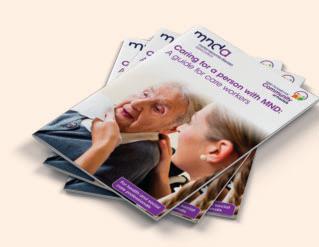
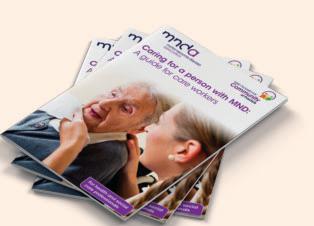


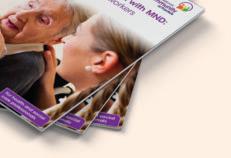

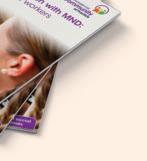

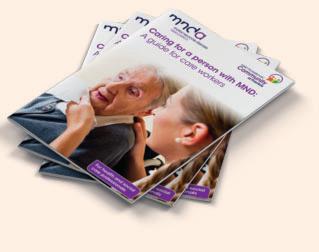
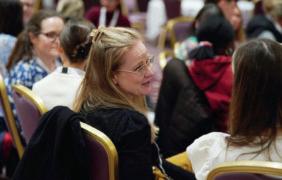
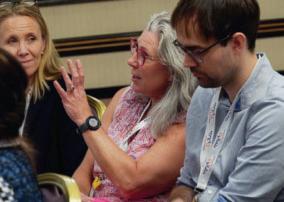
If you’d like to help shape future resources, contact infofeedback@mndassociation.org You can find links to our information resources at www.mndassociation.org / publications
MND is complex so the research we fund needs to cover a broad spectrum, from searching for causes, to developing treatments and exploring new ways of easing symptoms. Here’s a snapshot of some of the most promising MND Association-funded research happening right now.
Assisted dying in MND: Implications of cognitive and behavioural changes on decision-making
Research by Professor Sharon Abrahams at the University of Edinburgh explores how cognitive and behavioural changes, which affect up to 50% in people with MND, may impact their decision-making about assisted

dying – an issue currently under debate in the UK.
The findings could support ethical policy development and provide valuable guidance for families, clinicians and policymakers when navigating assisted dying decisions specific to MND.
Professor Shouqing Luo and his team at the University of Plymouth are exploring the role of a gene called p62 in MND. The p62 gene helps cells clear waste, but changes in it may disrupt this process and trigger inflammation in brain cells – something linked to MND progression.
Investigating changes that occur in RNA binding proteins in different cell types in MND
Dr Matthew White at King’s College London is studying how certain brain cells are affected by RNA binding proteins (RBPs), molecules involved in making other proteins. Some RBPs, like TDP-43 and FUS, are
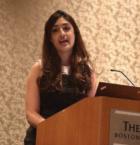
Read
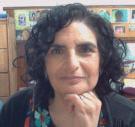
This project aims to understand how p62 changes in MND and whether it contributes to harmful inflammation. If a link is found, researchers will test to see if a natural compound can reduce this inflammation. The findings could offer new insights into how MND develops and open up possibilities for treatments that may slow the disease by reducing inflammation.
known to be linked to MND. In this project, Dr White will grow different types of cells in the lab to find the ones most vulnerable to problems caused by RBPs and identify why. The aim is to discover ways to protect these cells from damage. This research could lead to new treatment targets and improve our understanding of how MND affects the brain.
Developing a new gene therapy as a tool to rescue TDP-43 related gene changes in MND
Dr Puja Mehta at University College London is exploring a new gene therapy approach to tackle one of the key problems in MND –a protein called TDP-43 that moves out of its normal place in the cell and forms harmful clumps leading to consequences linked to MND disease progression.
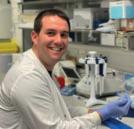
This work aims to correct some of the toxic effects of faulty TDP-43 in lab-grown cells and mouse models. If successful, this research could lead to the discovery of a new gene therapy and reveal a promising new treatment that may benefit up to 97% of people with MND.
website www.mndassociation.org/our-research/research-we-fund
People with MND are being urged to check they are receiving the benefits and financial support they’re entitled to as colder weather approaches.
The MND Association’s Benefits Advice Service is on hand to provide advice and support, whether you’re claiming benefits for the first time or need help to resolve benefits’ issues.
Since its launch in 2017 the service, provided in partnership with Citizens Advice Cardiff and Vale, has worked with more than 3,700 people, advising on more than 34,000 issues involving the full range of financial support from disability benefits to energy support schemes. This has put £19.9 million into the pockets of people with MND when they need it most.
In the first six months of this year, 327 people have been helped, unlocking more than £2.4 million – an average of £7,300 per person.
Joel Rajwadi, cares for his wife who has MND. He said: “It’s a really helpful service and easy to get through to. Great to receive advice from the same person on separate occasions. Would 100% recommend.”
Welfare Benefits Caseworker David Lloyd-Williams is encouraging people to reach out to the service ahead of winter. He said: “Our goal is to ease financial pressure so people can focus on their health and family. As winter approaches we’re recommending people check their entitlements, particularly for the Winter Fuel Payment, Attendance Allowance or Warm Home Discount.”
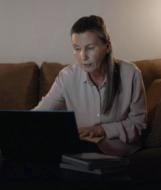
To use the service, call 0808 801 0620 or visit the MND Association website
The Belfry Hotel and Resort, home of the Betfred British Masters and four Ryder Cups, raised £110,000 in its first-ever Belfry Classic Golf Day. Held in May, the event brought together stars from sport and entertainment to raise money for the MND Association and Hospitality Action.
Celebrities including Olympic gold medallist Sir Steve Redgrave, Line of Duty and Peaky Blinders actor Nigel Boyle, footballer Alan McInally, and influencers F0urBr0thers played on the Brabazon course in four-ball teams.
Hosted by broadcaster Dan Walker, the day was packed with unique experiences, from a Beat the Pro with professional golfer and European Tour veteran Robert Rock, to a Hole in One contest with a golf buggy prize from John Deere. Guests also enjoyed Curry on the Course, courtesy of fine dining restaurant Five Rivers À La Carte.
The day ended with a gala dinner designed by Tom Shepherd, Great British Menu winner, featuring his famous No Ordinary Schoolboy dessert. With support from Turkish Airlines and Elliott Group, the Belfry Classic Golf Day will return on 21 May 2026.
Chris Eigelaar, resort director at The Belfry Hotel and Resort, said: “We were overwhelmed by the phenomenal response we
received from everyone who took part in our first-ever Belfry Classic. We’re immensely proud of what we achieved and are already looking forward to making the 2026 Belfry Classic even bigger and better.”
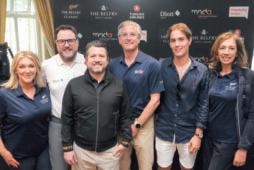


Through its partnership Northern will help to raise to support the Association's work
£70,000

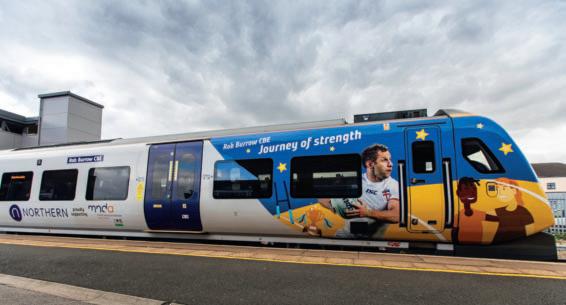
A new train bearing the name of rugby league legend Rob Burrow CBE, and our logo, has been unveiled in Wakefield.
As part of its charity of the year partnership with the MND Association, Northern has dedicated the train to Rob, who died from MND in 2024.
The train will make thousands of journeys a year across the network, was named at a special ceremony which was held at Castleford Station in North Yorkshire on 26 September, Rob’s birthday.
Tricia Williams, Managing Director of Northern said: “When we were asked to name a train after Rob, we agreed it was a fantastic opportunity to honour his legacy.
“So many of us here at Northern were inspired by Rob’s indomitable spirit and his commitment to helping others suffering with this cruel disease. That’s why we want to pay tribute to this great man; help raise awareness of MND and funding which can be used to help find a cure.”
The MND Association’s Chief Executive, Tanya Curry said: “Rob was a giant on and off the pitch – a man who showed such immense courage in sharing his diagnosis that he was able to open up a conversation about motor neurone disease which continues to this day. For that, and for everything his family has done, and continues to do to support us we are truly grateful.
“As one of the region’s most famous sons we can think of no better way to honour Rob’s life and legacy than with the naming of this new train. As the train travels through towns and cities many more conversations will be had about Rob, and many more people will learn about MND.”
As part of the wider partnership, Northern, which employs 7,000 staff across the region, has united to help raise £70,000 to support the Association’s work and further research into MND.
During the summer, the team organised a Seven Weeks of Summer campaign, taking inspiration from Rob’s number seven shirt. Staff took part in a number of events, including seven walks, covering a total of 70 miles.
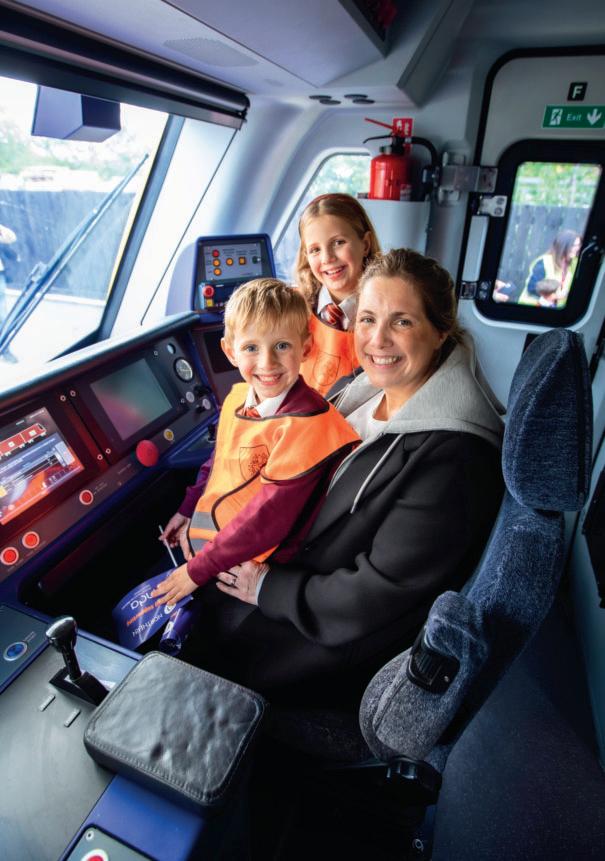
"As the train travels through towns and cities many more conversations will be had about Rob, and many more people will learn about MND."
Tanya Curry, MND
Association Chief Executive
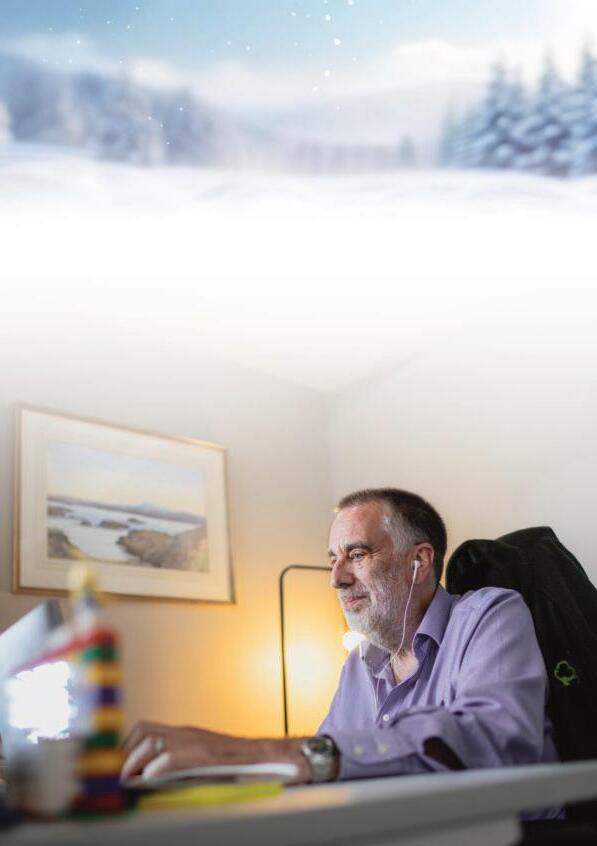

















As temperatures drop and the days get shorter, winter can bring added challenges for people living with MND and their carers. Colder weather and darker evenings can make everyday tasks more difficult, from getting out, to staying warm or keeping in touch with friends.













For many, this his time ime of year year can feel physically draining and dan isolating. But But you’re not alone. Whether it’s practical advice, emotional support or or helping to reduce isolation, the MND Association is here to o help you live as as well as possible through the colder months.


For Tom, who is living with MND, attending a monthly online support group gives him easy access to a community of people who understand. He said: “It’s nice to be able to talk to other people in a similar situation to my own. The atmosphere is welcoming and there’s no pressure to contribute anything unless you feel like it.”











Staying y g Sta in connected ted ec conn
There are around 90 MND Association groups and branches, offering nearly 200 support group meetings across England, Wales and Northern Ireland. “We offer a number of support groups for people to connect in a relaxed setting,” explains Jo Cunnah, Community Support Co-ordinator. “For those who can’t get out easily, online support groups offer a warm and welcoming alternative.”
Others find connection through the MND Association’s online forum, where people living with and affected by MND come together to chat and share advice. Ellie, a regular forum user who is living with MND said: “On the forum I’ve found a sense of belonging. It offers support, advice and friendship from people who really understand what we face on a daily basis. It’s a safe place to moan, to weep, to bare our souls and yes, to laugh too.





“It’s s t “I ’ nice to be able to talk to other people in a similar situation to my own."




Tom Jenkins
warm and well
The MND Association has a wide range of information sheets to help people living with MND live as well as possible. The resources cover everything from managing symptoms to staying safe at home and supporting personal care. You can explore them using the Care Information Finder on our website. For tips and advice from others living with the condition, MND Association forum members often share their personal routines for staying healthy. One MND forum member said: “I stay hydrated to help thin my mucus. Saline nasal spray is great for blocked noses and I have a nebuliser. I take daily vitamins C and D and avoid anyone with a bug. I also get my flu and Covid jabs.”
One forum member recommends ponchos and wearable blankets with buttons. They said: “They’re easy to put on, with no sleeves and simple to layer. I get shorter ones so they don’t get caught in the wheels.” Another member shared: “I use ponchos and blankets wrapped tightly from the waist, waterproof leg covers, insulated trousers, a big bobble hat and thick sailing mittens.”
Help with winter costs
We understand heating your home and managing energy bills can be a real concern, especially if you use powered equipment. The MND Association offers a range of grants, including a Cost of Living Grant of up to £500 to help cover essential costs such as heating or food. To find out more about what’s available and how to apply, scan the QR code below or call MND Connect.

MND Association support groups
Scan the QR code for more information
We asked you on social media what you do to live well during the coldest months. Here’s what you told us, along with some tips you shared.
We tried to do something each day like go for lunch, visit friends, watch a film or go for a drive. We didn’t always manage it, but we tried to have something to look forward to.
I like to meditate in the morning.
I get out into the fresh air as much as possible. Good friends take me to watch local football. I’ve tried drawing (I’m no artist) but it passes a few hours.
We’re supporting our wellbeing by committing to 12 walks in 12 months, supporting each other whilst raising funds and awareness of MND.
Jigsaws are a great ‘ mindful’ activity. If you have an accessible table where the jigsaw can stay, I find a few minutes soon becomes an hour and also helps keep my hands supple.

Whether you’re looking for emotional support, practical guidance or someone to talk to, the MND Association is here for you. You can find more ideas and suggestions on our forum or through our Care Information resources.
MND Association grants
Scan the QR code for more information
MND Connect
Available Monday to Friday between 9am - 4pm on 0808 8026262 or email mndconnect@mndassociation.org
It’s one of the privileges of my role as Chair that each year I get to welcome passionate new people to our Board to work alongside, learn from and introduce to our MND community.
At this year’s Annual General Meeting (AGM) back in July, you, our members, voted three dedicated new trustees into post. Many of you will already be familiar with them –Eleanor, fronted our successful Prescribe Life campaign last year, Marc has been a key figure in our new partnership with Challenge Works and Sue has been involved with the Association for an incredible three decades!
You can read more about them on the next page. All three, along with our new co-opted trustee Craig Jones will, I know, bring invaluable knowledge and experience to the table as we, the Board, support the Association’s leadership team and staff body to power forward with the work needed to deliver on our new strategy.



















As usual the end of the year calendar is a busy one – I do hope to meet some of you at our planned events over the coming months.
£2.4m worth of eligible claims have been unlocked by our Benefits Advice Service for 327 people living with MND.
584k Daily Express readers saw front page coverage of our Prescribe Life campaign in July with 22k signing our petition.
£4.1m raised by the Omaze appeal is funding our research nurse network, which has already successfully recruited 3 nurses.
50% increase in Carer’s Grants compared with the same period last year.




Together, we’re aiming high - we have big ideas and robust plans, and it’s been heartening to see those starting to be delivered. Our first clutch of MND Association Research Nurses are now working at Care Centres and Networks around the three nations (see page 7); our day of action, including the ice sculpture of Seckin McGuirk on Parliament Square Garden, catapulted our demand for access to tofersen right to the heart of power (see page 4); and our latest EnCouRage event brought some of the future’s brightest hopes in MND research into the fold of the Association (see page 8).
w v avha e we ve have and it ’s se tc ee ic ma he l so e at a e ch f are now Networks e page 7); our ce ent Square and for e heart of atest ome es in f the t
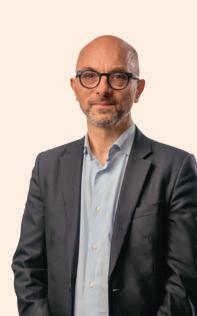
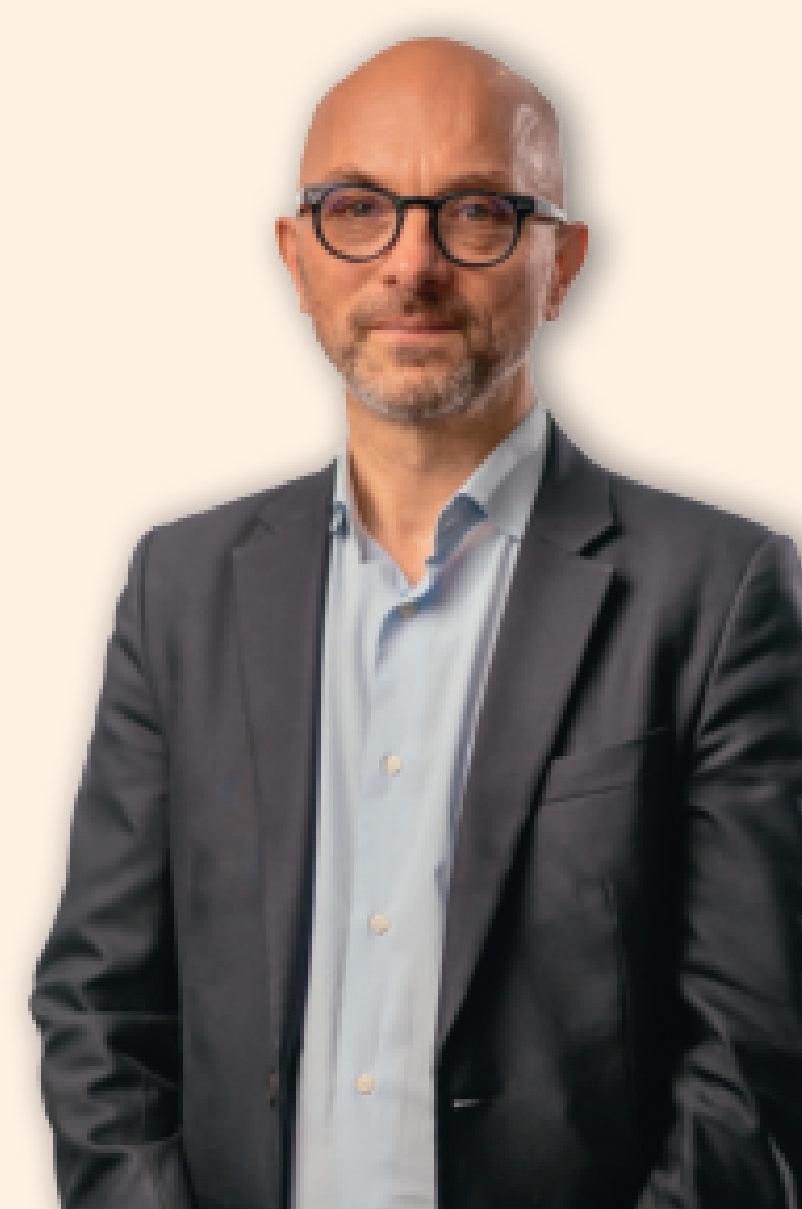
£660k worth of Cost of Living Grants have been awarded to 1,300 people with MND (an increase of more than100% since June 2024).
92 people affected by MND attended a family memory making day at London Zoo in September.
3,352 calls and emails were handled by our Connect helpline team – an 8.2% increase on 2024.
£5m investment into the Longitude Prize on ALS, helping spearhead global innovation in MND research.
We’re delighted to welcome four new trustees to our Board, each bringing unique experience, insight and passion for our cause.
With a career in nursing and hospice leadership, Sue’s dedicated her life to palliative and end of life care. She was motivated to start volunteering with the Association after her mother-in-law's death from MND 30 years ago.
Sue said: “My mother-in-law died in hospital suddenly, with no advanced care planning and her death was more stressful than it should have been.
"Care has improved but inequalities still exist. As a trustee, I want to support change so it’s not a postcode lottery. I also want to champion the support given by branches and groups, they’re doing a fantastic job supporting people with MND and their families."
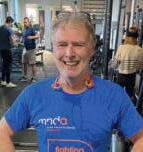
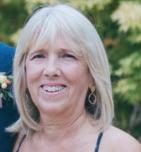
Marc was diagnosed with MND in July 2023. He has a background in the healthcare industry - in 2001, he helped secure NICE approval for riluzole, the drug he now takes.
He said: “That was my first exposure to MND, my second was through my dad, a GP who has an unusual fascination with the disease, and my third was my own diagnosis.
“I hope with my background in the healthcare industry I can make a contribution to getting faster access to emerging treatments and diagnostics. I’m keen to see greater engagement between the charity and the pharmaceutical and med-tech industries and look forward to helping with this.”
Eleanor was diagnosed with MND in 2019. Her dad, two aunts and a cousin have all sadly died from the disease. Professionally, she has held senior roles in luxury retail. Eleanor served on her local branch committee and has been heavily involved in the Prescribe Life campaign.
Eleanor said: “I first became aware of MND when my aunts were diagnosed in 2018. Since then, it has devastated our family. I want to do all that I can to help and support others affected. Being on the Board allows me to support the delivery of the Association’s new strategy and ensure that decisions are always grounded in the lived experience of people with MND.”
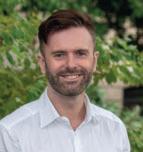
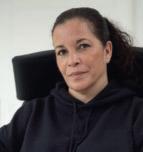
Craig is Chief Executive of the Royal Osteoporosis Society and has held leadership roles in membership and regulatory bodies over the last decade. Craig has a background in government law, policy and charity leadership.
Craig said: "The Association is extremely well-regarded in the charity sector, and it is a privilege to be part of its work. I'm looking forward to meeting members of the community and understanding what more we can do to live up to their hopes and ambitions for this important cause.”
Dr Katie Hanna is an MND Association-funded Postdoctoral Research Fellow at the Gregory Lab, University of Aberdeen.
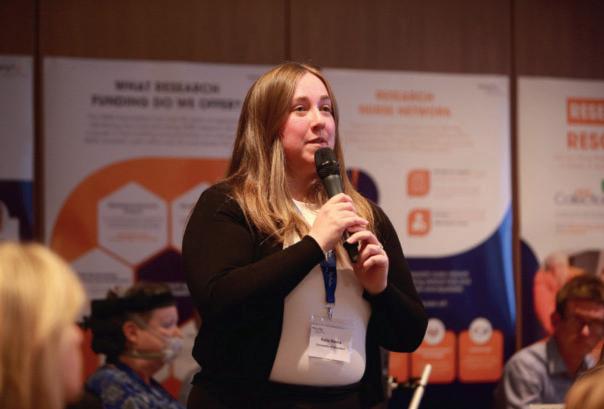
With a PhD in Cancer Sciences, Katie is applying her oncology skills to explore ways of detecting MND before symptoms start.
She’s working to understand if it’s possible to diagnose MND using skin, sweat and sebum. Her focus is on developing a probe-based skin test to detect MND, to understand if a person is at risk and to monitor the effects of future treatments.
Katie explains: "I’m looking for early signs of MND from the skin. We want to develop a screening tool using a laser device to identify people in the earlier stages of the disease. This type of screening test could potentially identify people up to four years before they have symptoms.
"If you look at skin samples from people with MND under the microscope we’ve seen changes which we believe could indicate motor neurone disease.
"We’re working with groups in Exeter and Oxford to develop a handheld device to do a sweat test which could be used in the future, perhaps in GP practices or pharmacies, as a really simple way to give a risk score.
"While I started out in cancer research, I’ve always maintained a deep interest in neuroscience and neurodegenerative diseases. When the chance came to bring my skills into MND research, it felt like the perfect way to combine my expertise with something I’m deeply passionate about.
"The urgency for better diagnosis and monitoring is clear. What really drives me is meeting people with MND and their families; seeing their strength and hope reminds me that every step forward in the lab could one day make a real difference in their lives.
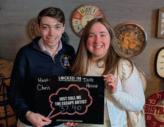
"When I’m not working, you’ll probably find me locked in an escape room with my fiancé Jack (by choice!), singing or at the theatre – in fact this November I’ll be on stage myself in Shrek the Musical."
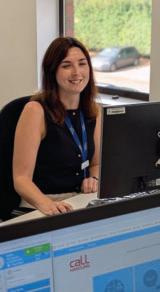
More people with MND are accessing specialist continuing healthcare (CHC) advice thanks to an MND Association pilot scheme which has transformed the referral process.
The service, provided by independent specialist Beacon, has seen a 525% increase in enquiries from people with MND since our partnership launched in April, which offers a much simpler process for people needing support.
People with CHC funding issues can contact our MND Connect Helpline to receive support with the option for direct referral to Beacon. A specialist adviser will aim to make contact within five working
days and provide 90 minutes of free, personalised CHC advocacy support.
The Association is the only charity which partners with Beacon in this way. The exclusive partnership is the first stage in improving how we better support individuals navigating the process of applying for CHC funding.
Hayley Koumas, Service Improvement and Transformation Programme Lead at the MND Association said: “The number of people accessing Beacon in the first four months of the pilot matched the total for the entirety of 2024. The pilot so far has been a great success, and more people are getting the vital support they need.”
To access CHC support, contact MND Connect on 0808 802 6262. For more information on CHC visit www.mndassociation.org/chc or scan the QR code.
The second series of our Back to Basics blog is now available online. Back to Basics is a series of easy-toread articles to make MND research more accessible. Developed alongside people affected by MND, this new series covers genetics, clinical trials and biomarkers.
The first blog in this newly-published series, What is genetic MND? explains that, while most people with MND don’t have a family history, gene changes can still play a key role in how the disease develops – even in sporadic cases. Researchers have now identified over 40 genes linked to MND, offering valuable insights into its causes.
The second blog, What are biomarkers and why do we need them? introduces biomarkers – measurable changes in the body that can track disease progression, improve diagnosis and help inform treatments. The next blog builds on this topic. What biomarkers do we have for MND? highlights the urgent need for biomarkers to speed up diagnosis and understand how fast the disease will progress. Promising developments in artificial intelligence may help uncover new, more accurate markers.
Finally, the blog What are Clinical Trials? explains how new treatments are discovered and tested, and how biomarkers can help measure a drug’s effectiveness more precisely – offering hope for more targeted, effective therapies in the future.
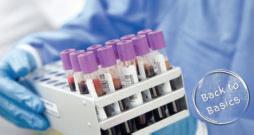
There are many ways to get involved in MND research from filling out a survey to testing a new treatment or by taking part in a study.
Some people with MND experience changes in how they think or behave, but these symptoms can be hard to spot and aren’t always picked up early. Researchers at the University of Sheffield are testing a new digital tool, called CognoMND™ which is like a virtual doctor on a screen. The virtual doctor asks questions, listens to the answers and uses advanced computer analysis to

Scan the QR code to find out more about CognoMND™ on our webpage
look for signs of thinking and behaviour changes. They hope it will make screening for thought and behaviour changes easier, faster and more accessible which will mean people can get the support they need sooner.
The researchers are keen to find out how well the tool works and how to improve it. They are looking for people with MND and their carers to talk to CognoMND™ and give feedback about their experience.

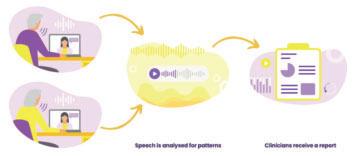
or caregiver conversation with CognoMND virtual agent is recorded


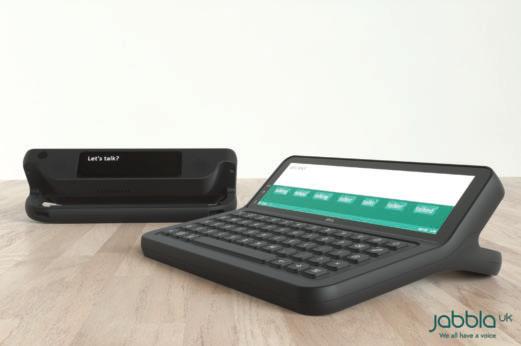
By our patron Kevin Sinfield CBE
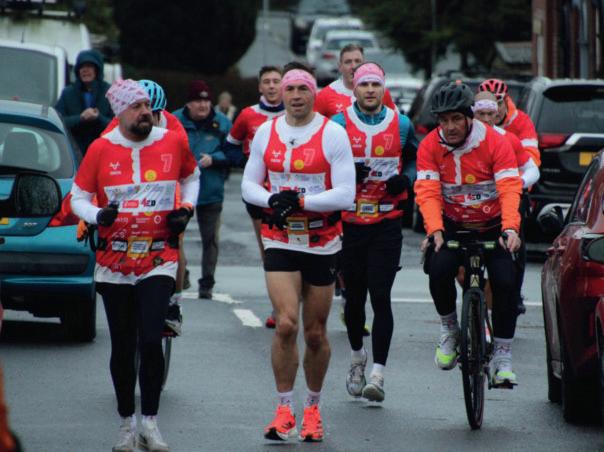
We’re getting ready once again to pull on our trainers for our sixth 7 in 7 challenge on behalf of the MND community. It’s great to have the team back together. We’ve shared so many miles and made so many incredible memories.
We’re already clocking up the miles, preparing for the physical and mental demands we know the first week in December will bring, there are lots of early mornings and late nights running in all weathers, but it’s important preparation for what lies ahead. Rugby training keeps me fit but is nothing like running the sort of the distances we’ll be covering.
With five challenges under our belt, we know what it takes to ensure we’re as fit and strong as we can be. And of course, there’s still plenty of work to do
behind the scenes, particularly around the logistics – routes, transport, food, accommodation... seven days on the road is a lot!
Despite all the challenges, the best part is always the love and support we receive from the community. It’s the stories of courage and the strength we get from people who come out to see us which give us the fuel to carry on when times are tough.
The money raised from our challenges is already making a huge difference to the MND community – helping to fund support for people living with MND and important progress towards finding new treatments. Every penny has the potential to change lives, so please support us if you can and come out to cheer us on when we’re out on the road.
See you in December!
"With
five challenges under our belt, we know what it takes to ensure we’re as fit and strong as we can be. And of course, there’s still plenty of work to do behind the scenes."
Kevin Sinfield CBE
For more information and to donate just scan the QR code
Whether you’re a seasoned runner wanting to tackle a different course or a newbie to marathon running seeking the perfect first 26.2 mile challenge, few events rival the atmosphere at the Manchester Marathon.
Not only is it the UK’s second largest marathon, after London, and the fourth largest in Europe, it’s fast becoming one of the most popular charity events in the calendar. And it’s a flat course so no hills to interrupt your rhythm, and the chance to record a personal best.
This year, 115 runners raised £95,000 to support people affected by MND. In 2026 the Association is hoping to raise more than £160,000. We have 22 charity places available – and we’d love to welcome runners who’ve secured their own place to join us too!
Stephanie Whalley ran the Manchester Marathon this year in honour of her
mum, Sharon, who’s living with MND. She said: “My mum is the strongest woman I know. She encouraged me to take on the marathon and sent me lots of text messages on the day. Her messages really got me through. I’ve never done that distance before, so it was a huge achievement. Also doing it for my mum just made me proud.”
The entire route is lined with spectators and at mile 21 there’s a very special morale boost for our runners from volunteers with the Manchester and District Branch hosting a cheer point.
“My mum is the strongest woman I know. She encouraged me to take on the marathon and sent me lots of text messages on the day."
Stephanie Whalley
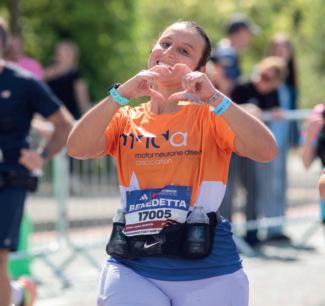

Next year’s Manchester Marathon is on Sunday 19 April. The registration fee is £30 and we ask that you raise a minimum £450 through sponsorship. For more information visit www.mndassociation.org/manchestermarathon

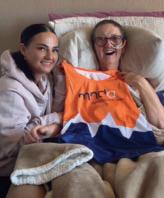
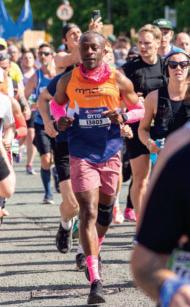
More than 1,000 delegates, 22 keynote speakers and people with MND from around the world will come together at our 36th International Symposium on ALS / MND.
The three day event in December is the world's biggest gathering of research and care professionals, and will showcase the very latest news from cutting-edge scientific discoveries to practical innovations in care.
The Symposium, organised by the MND Association team, is being held in San Diego, USA, and provides a platform for
innovative ideas, creative new collaborations and global discussions.
Researchers from across the world have the opportunity to test ideas with each other, refine theories and develop new crossdisciplinary work.
Alongside expert talks, poster sessions and breakout meetings, people with MND will be at the Symposium to share their experiences of living with the disease, so helping to shape the future of research and care.
Registration for both in person and online attendance is now open. Visit https://symposium.mndassociation.org or scan the QR code to find out more.
For those following from home, there will be a new live feed on our website, capturing key moments and highlights throughout the event.
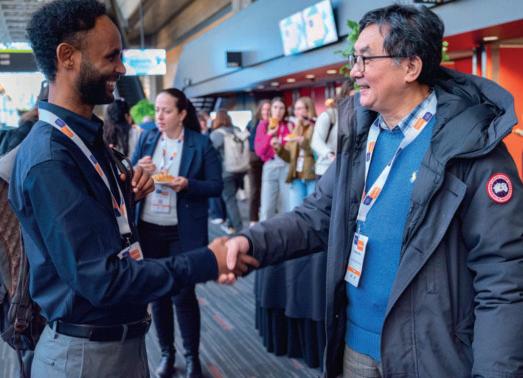
Psychological care is an important part of supporting people with MND, yet access to it is inconsistent and there’s limited evidence on the most effective way to provide it. To improve this, the MND Association is funding a new project, called iDeliver, led by researchers at the University of Sheffield.
This study is gathering feedback from people living with and affected by MND and healthcare professionals to identify what psychological support is important, and what is most likely to be helpful. The goal is to provide evidence-based recommendations for the best way to provide psychological services, to meet the needs of people with MND.
This work builds on the findings from the COMMEND study, funded by the MND Association and the National Institute for Health and Care Research (NIHR). COMMEND provided strong evidence that Acceptance and Commitment Therapy (ACT) can help improve the quality of life for people living with MND. In response, the MND Association is launching free ACT online training for psychologists so they can offer ACT to people with MND.

For many people affected by MND, Association visitors (AVs) provide a vital lifeline, providing support at home during some of life’s most difficult moments.


Find out more about the COMMEND study at www.mndassociation.org/commendstudy
Heath and social care professionals can book onto ACT training at www.mndassociation.org/online-courses


To support our AVs, we hold Development Days across the UK. These events are designed to refresh knowledge, foster new learning and deepen understanding of key topics such as safeguarding and the evolving needs of those with MND.
Recently, volunteers from five branches and groups across London gathered for a Development Day. Organised by Abigail Igbokwe, Community Support Co-ordinator, the day brought together a group of AVs and other volunteers keen to connect, share stories and expand their skills.
A highlight was a session called Understanding the Reasoning Behind What We Do, featuring a range of presentations, including from Speech and Language Therapist Richard Cave. Richard’s talk on assistive technology and communication opened up new perspectives on tools like voice banking and the role that technology plays in maintaining connection and dignity for people with MND.
Abigail said: “Feedback from the day was positive, with volunteers noting that it helped deepen their understanding
of the Association’s ongoing work. It was a great opportunity for volunteers to improve their knowledge of areas such as safeguarding and voice banking, to connect with others and to hear about their experiences and roles.
“Our AVs and volunteers make a big difference to people living with MND and that’s why we want to continue to support them and show how vital they are to the work of the charity.”
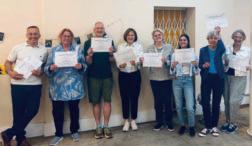
For 500 days, people in Nottinghamshire and Derbyshire watched a remarkable challenge unfold. Wearing an MND Association vest and waving an orange and blue flag, Rob Tiffney walked 5,000 miles in 500 days, raising over £51,000 for the MND Association.
Now affectionately known as ‘Flag Man’, Rob has become a local hero, cheered on by children, passing drivers and strangers who have shared their own MND stories or simply handed over money to support his efforts.
Rob said: “The support from the local community has been incredible. Everyone was touched at what I was doing for the charity without any personal connection.”
Rob’s motivation came from watching rugby legend, the late Rob Burrow CBE speaking about his MND diagnosis. “I’d never heard of MND before. Then Kevin Sinfield gave him a hug and told him ‘you’ve got this’. That moment really struck me. It inspired me to do my bit.”
Rob had already completed a virtual walk covering the equivalent distance of Land’s End to John O’Groats, but wanted a bigger challenge. He said: “With 5,000 people living with MND at any one time, I decided each mile would represent a person living with the disease.”
He ended his epic challenge with a two day 77-mile walk to Headingley Stadium in Leeds, honouring Rob Burrow’s iconic number 7 shirt. Since then, he has run the Great North Run, the Cardiff Half and is preparing to do the Winter Walk with his family.

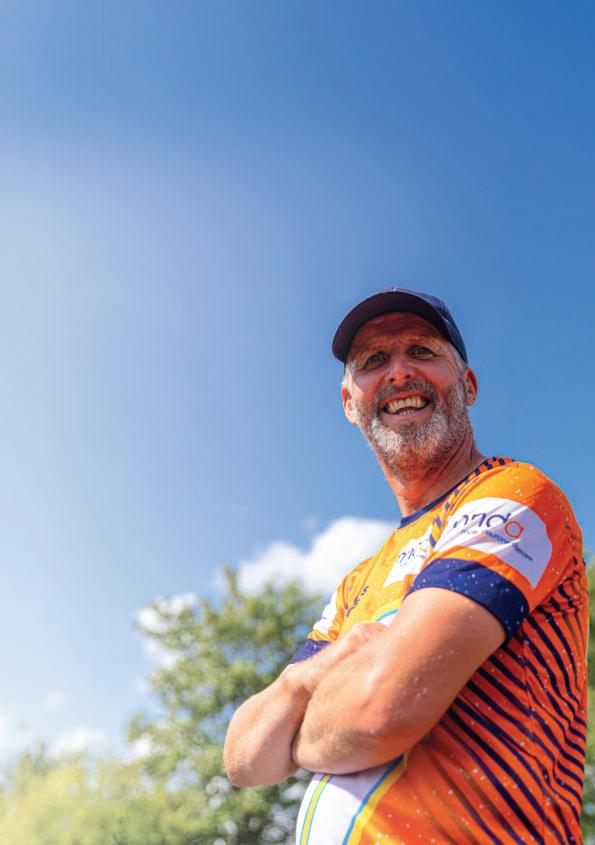
“The support from the local community has been incredible."
Rob Tiffney
By Tracy Sanderson, Chair of the West Yorkshire Branch
There’s a lot of hugging in our groups; an awful lot of hugging and a fair amount of crying on shoulders too. But that’s ok - I’m a hugger!
Our branch runs three groups a month: a general support group we call a ‘get - together’ because it feels a bit more informal that way, a bereaved carers’ support group and a current carers’ group.
We move our get-togethers around the region to keep things accessible and affordable. West Yorkshire is a big area, and not everyone finds it easy to travel. But wherever we meet, the aim is the same - connection and friendship.
These get-togethers are so important, especially for carers. Of course, it depends how advanced the person with MND is, and what level of care they need, but for partners to be able to get out, be around other people and just have a bit of a moan is vital.
Cognitive changes can be especially tough. Your loved one isn’t quite the same person anymore, and that’s such a hard thing to deal with. I didn’t go through that with my husband David, but I’ve seen it in other couples and it’s really difficult to manage. That’s where the support from the group really comes into its own.
"Getting people to take that first step and come along is the hardest part. But once they do come, we tend to keep them, which is wonderful."
Tracy Sanderson
Over time, something very special has happened. Our regulars have formed their own community. There’s a WhatsApp group and they really support one another. When someone dies, it hits them hard. We always ask the family if it’s okay to tell the group, but word usually gets around through the group anyway. One lady’s daughter recently invited the whole group to her mum’s life celebration – not just the volunteers, but the other people with MND and their carers too. That’s how close they’ve become.
Getting people to take that first step and come along is the hardest part. But once they do come, we tend to keep them, which is wonderful. They see it’s not just a support group – it’s something more.
Recently we held a get together at Wakefield Trinity’s stadium. We had 32 people, including two newly-diagnosed. It takes a few of us to manage it all, but watching those connections form makes it all worthwhile. Because at the heart of it, this is about friendship, and that’s what keeps all of us coming back.
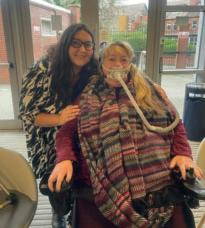

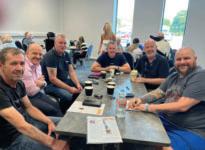
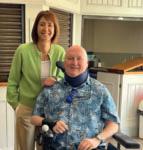
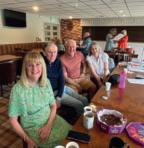
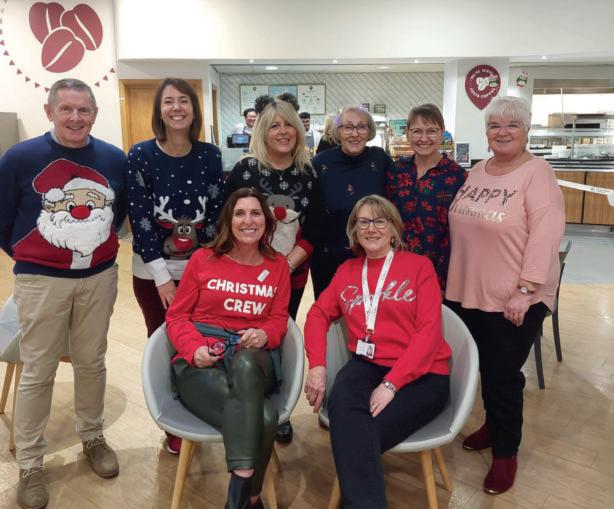
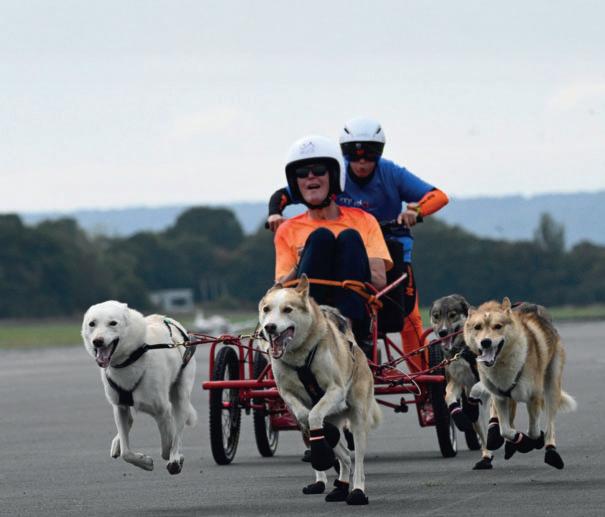
Eight years after being diagnosed with MND, Paul Jameson has broken four world records while also attempting to raise more than £88,000 for the MND Association.
To mark the anniversary of his diagnosis in June 2017, Paul created the aptly named 8 for 8 Challenge, which saw him take on eight charity challenges and aim to break four Guinness World Record titles at the same time.
In September, Paul partnered with a team including world champion dog sled sprinter racer Vickie Pullen and broke four world records - the fastest mile pushing a wheelchair (by a female); the fastest mile pushing a wheelchair (by a male); the fastest time for two people to cover 400m in a wheelchair pulled by dogs; and the furthest distance covered for two people pulled by dogs in a minute.
Other events held during the summer have included a golf day at West Surrey Golf Club and the launch of his new book Say Yes to Life: And No to Heaven.
He explained: “I’ve had a very close relationship with the MND Association since I did my first fundraisers in 2017 and they’ve assisted me in many ways, from advice and contact to grants and benefits. I’m also on the committee for my local West Surrey branch which helps keep everything real and I get to see how the funds are being used to help people living with MND in the local area.
“I am incredibly lucky that I seem to have a slow progression and still manage to lead a very happy and fulfilling life. I’ve seen many people who’ve lost their life within a short period of time after diagnosis with MND. Do I wish I didn’t have MND? Of course I do. Can I see the
many positives that I’ve had since my diagnosis? Most certainly yes.
“It fills me with great joy that I can still achieve things like this, despite not being able to talk, walk or do a lot of the other things people can.”
Paul Jameson
The money raised by Paul will be donated to the West Surrey Branch of the MND Association.

By Katharine Towell
My mum first noticed something wasn’t quite right in January 2019, but it took over a year and a half to get a diagnosis of MND. Mum lived with MND for six and a half years, with the last two being the most difficult. Her first hospital admission was due to aspiration pneumonia, and things gradually deteriorated after that.
It was really important to Mum to support the MND Association, so we both signed up to make a monthly gift to the charity soon after her diagnosis. Even while she was coming to terms with the news she wanted to help others. That was the kind of person she was.
As her main carer, I saw the toll MND took on her every day. It was devastating. But we decided we would focus on supporting the MND Association. We donated, raised awareness, signed petitions and took part in fundraising challenges. I ran the Run21, the Santa Run and walked over 15 miles around Rutland Water.
Mum asked for donations instead of flowers at her funeral. Shortly before she died, she asked if I would continue to support the MND Association. Mum was so precious to me. She was 62 and deserved so much more life. She was a glass half full kind of person and always looked for the positive. I promised her I’d keep fighting. For her – Jane Percy. For others. And for the cure we all still hope for.
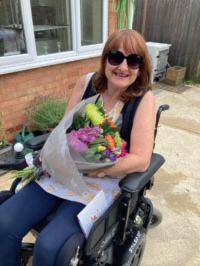
Dysphagia in MND information sheet
Our information sheet is designed to help professionals manage swallowing difficulties in people with MND.
Dietetics and Nutrition infographic
The infographic summarises national guidelines to help professionals manage the nutritional and hydration needs of people with MND.
Caring for a person with MND: a guide for care workers
Our booklet offers guidance and advice on supporting the needs and everyday care of a person with MND.
How to find our information
Find our resources, including for professional and research at: www.mndassociation.org/publications or order printed copies from our MND Connect helpline: 0808 802 6262, mndconnect@mndassociation.org
To search for our resources by need, use our care information finder at: www.mndassociation.org/ careinfofinder
For professional resources, use our professional information finder: www.mndassiociation.org/prof-info-finder
Help our information development
We work alongside people with MND or Kennedy’s disease, and their carers, to develop and improve our information in a range of formats. Join our user reviewers and make a difference from the comfort of your own home.
Find out more from: infofeedback@mndassociation.org
BE WELL FEST
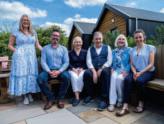
£10,000
Sue Bates and the team at Bewell Barn held a special event on 28 June, raising £10,000 for the Suffolk branch. Be Well Fest was a day of fitness, music and food bringing together the local community in support of Sue’s brother-in-law Adam, who is living with MND.
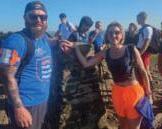
£800
Joanne and Steve Kell completed the Yorkshire Three Peaks in 10 hours and 15 minutes, raising over £800 in memory of Joanne’s dad, Brian.
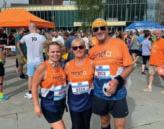
£2,200
In memory of his wife Denise, Duncan Watkins and daughters Rachel and Natalie completed the Peak Ultra 10 mile walk, while friends ran the Barnsley 10K the next day. Together, they raised more than £2,200 for the South Yorkshire branch.
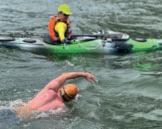
£20,000
Sami Robertson completed an epic 20 bridges swim around Manhattan. Covering 48km swimming the East, Hudson and Harlem rivers at night demanded months of training, focus and determination.
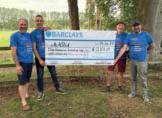
£11,000
In memory of local musician Brendan, the Tiffield community raised more than £11,000 for the MND Association. His bandmates held Music for MND at The George Inn, followed by Steven Smith and Tom Wilkins taking on the National Three Peaks Challenge in July.
RACE
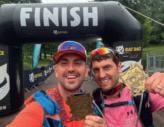
£7,500
In memory of a dear friend and to support a colleague whose father also died from MND, Ben Graney completed the 100 mile Rat Race from Bamburgh to Edinburgh Castle, raising £7,500 for the South Yorkshire Branch.
If you are sending in pictures to feature on these pages please ensure you have permission to do so
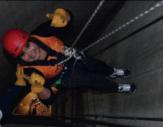
In tribute to her friend Kathy, Kim Fletcher faced her fear of heights and abseiled down the Northampton Lift Tower, raising £1,700 for the Bedfordshire Branch. Despite the windy conditions, Kim’s courage honoured Kathy’s strength and kind-hearted nature.
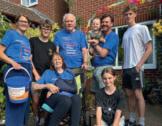
£1,700 After her mum Jean’s MND diagnosis, Claire Keyte hosted a cake and fizz sale outside Jean’s home. Claire said: “Mum was a fantastic cake baker before MND stopped her from baking. So a cake sale seemed like the perfect way to raise much-needed donations.”
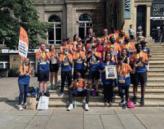
When Satpal Singh was diagnosed with MND, over 40 of his colleagues from Leeds Teaching Hospitals rallied around and pledged to run the Leeds 10k. Sadly Satpal died in March. He knew of their challenge, but never saw them cross the finish line.
£17,800
Determined to do ‘Satty’ proud, the team, affectionately known as Satpal’s Sprinters, went the distance and raised £17,800 in his memory.
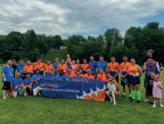
£1,500 Now in its fourth year, the BAE Systems Charity Football Tournament honours the memory of employee Chris Hopper, whose name is on the winner’s trophy. Growing stronger every year, this year’s event raised over £5,000.
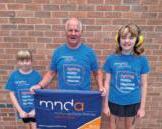
£5,400
When Shona Knight’s dad William was diagnosed with MND, her daughters Amber and Lily wanted to raise money for the MND Association. They set themselves a challenge of walking 100 miles in June. William decided to join in the challenge and cycle 600 miles during the month. The family raised over £5,400!
£5,000
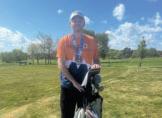
Paddy Towson
£10,000
Sheehy played seven rounds of golf a day for seven days in June, in memory of his Uncle Alan from Yorkshire. Paddy said: “He was such a big part of our family and played the game with so much love. I’ve always loved golf, so this challenge just felt right — one swing, one step at a time, for him.”
HAVE OUR STORIES ENCOURAGED YOU TO TAKE PART IN AN EVENT?
If you’ve been inspired to take part in a fundraising event for the Association, there are loads of ideas to make a difference at www.mndassociation.org/fundraising
Jonathan Phang, presenter, broadcaster, food writer and cook is an ambassador for the MND Association. We asked what this role means to him.
Q. What motivated you to support the MND Association?
A. After losing my dear friend Jane, and then my beloved sister to MND, I was determined to support the Association. Throughout my sister’s illness, the Association provided us with invaluable support and, for that, I’m eternally grateful.
Q. What role would you like to play in making a difference to people with MND?
A. I hope to raise awareness about the realities of living with MND and the profound impact it has on families and loved ones. I’m working with local individuals and organisations to find creative ways to fundraise. I also volunteer my photography services at events. I believe awareness leads to action and action leads to funding for research. My hope is that one day, this research will result in a cure.
Q. What’s your go-to way to unwind after a busy day?
A. As a freelancer, no two days look the same, but one constant is my early start. No matter how late I go to bed, my body clock wakes me at 6:30am. My dog, Ella, is usually less enthusiastic, but since we live in a flat without a garden, I have to coax her out for her morning walk. To unwind, I enjoy putting the world to rights over a bottle of wine with good friends. Cooking and photography are also incredibly therapeutic for me. And when I need to switch off, getting absorbed in a great documentary or box set helps.
Q. What motivates you?
A. My family and friends, both those still with me and those who’ve passed, are my greatest motivators. They keep me grounded and give me strength. Most mornings, as I get off the tube and look up at the steep escalator ahead, I think of my sister. I remind myself: she would have given anything for the chance to walk those stairs one more
time. So, I tell myself, “Get up, move your butt and appreciate the gift of your life. Climb those stairs for her — and for all those who can’t. Stand tall on the shoulders of those giants who came before you and loved you.”
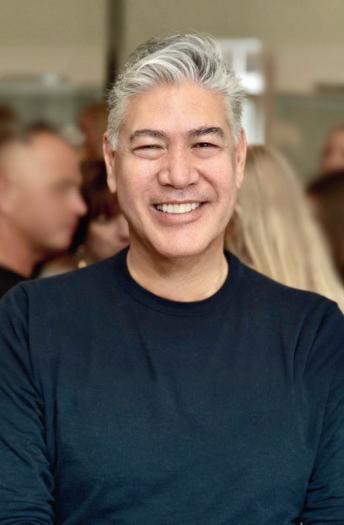
"I hope to raise awareness about the realities of living with MND and the profound impact it has on families and loved ones."
Jonathan Phang
Jonathan is a guest contributor in our latest MND Matters podcast, Eating and Drinking with MND featured on page 39. Listen now at www.mndassociation.org/mndmatters
With more than 35 episodes available, the Association’s MND Matters podcast offers a wealth of information and insight from experts and members of the community. Dip into the episode library at any time to hear informal advice, information and real-life experiences about a range of topics including managing emotions, family support and becoming a carer for someone with MND.
Episode 37: Eating and drinking with MND
In this powerful episode, host Domonique is joined by Lorraine Redmond, who has MND; Emma Woods, a clinical lead dietitian; and Jonathan Phang, a cook and MND Association ambassador. Together, they explore the emotional and practical challenges of eating and drinking with motor neurone disease.
Episode 36: Driving change for the MND community
Chief Executive Tanya Curry and Director of Engagement Richard Evans reflect on a landmark year for the Association - highlighting record fundraising, expanded grants, bold advocacy, and our research nurse network. They share how the charity is focused on delivering more impact through faster access to emerging treatments, targeted support, and a louder voice for the MND community.
Have you got a topic you’d like us to cover on the podcast? Email communications@mndassociation.org with your suggestion.
LISTEN ONLINE
Listen to all episodes on our website at www.mndassociation.org/mndmatters or search MND Matters wherever you get your podcasts.
Hello!
I’m Sophie, the MND Association’s new Involvement Manager. I feel privileged to step into this role, which is about strengthening our partnership working with you, the people who have lived experience of MND.
My vision for involvement is simple: it should be inclusive, meaningful and impactful.
Already I’ve had lots of helpful conversations, the next stage is to develop an Involvement Board to steer this work. And I’ll be listening to you to hear and understand your thoughts and ideas. Involvement isn’t a fixed way of working, it should feel flexible and accessible, something you can engage with at different levels, from quick surveys to joining advisory groups, or co-production projects and judging panels.

The Motor Neurone Disease (MND) Association
We improve care and support for people with MND, their families and carers, and fund and promote research that leads to new understanding and treatments. We also campaign and raise awareness so the needs of people with MND and everyone who cares for them are recognised and addressed by wider society. As a charity we rely on voluntary donations. Our vision is a world free from MND.
Online forum A place for people affected by MND to share experiences and support each other. https://forum.mndassociation.org
mndassociation mndassoc mndassoc
Our MNDConnect helpline offers advice, practical and emotional support and signposting to other organisations. Open Monday to Friday 9am to 4pm
mndconnect@mndassociation.org
To receive a regular copy of Thumb Print, call 01604 611860 or email membership@ mndassociation.org
If you would prefer to receive your copy of Thumb Print under plain cover please let our membership team know.
And it must lead to real change – that’s why I’m committed to feeding back at every stage so everyone who shares their experiences can see how they’ve made a difference.
I’m looking forward to meeting you!
Sophie Cordwell James




























































































































































































































